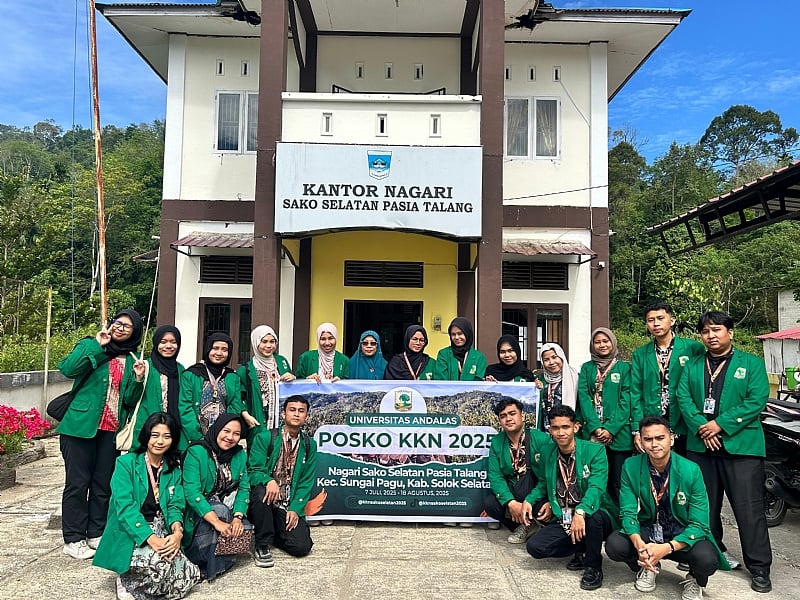Kuliah Kerja Nyata (KKN) is a program for students in Indonesia to serve the community, which they must undertake as part of their educational objectives, particularly in assisting others. This program is designed so that students not only master their subjects in the classroom but can also apply their knowledge to help others. Through this program, students live with the community in a particular area for a temporary period, typically ranging from one month to 40 days. For the Unand Regular II KKN, the program runs from July 7, 2025, to August 17, 2025. During this time, students study the challenges faced by the local community, such as social, economic, cultural, and environmental issues, and assist in resolving these issues using the knowledge they have gained at the university.
The aim of this program is to provide students with real-world experience so they can apply the knowledge gained at university in real life, ensuring learning is not limited to books, libraries, or classrooms. This activity also aims to help students develop empathy for others, social awareness, and the ability to adapt to different cultures and backgrounds. During the program, students will interact with the local community, identify existing issues, plan projects tailored to the area’s needs, and take actions that help improve the community’s quality of life.
One of the universities in Indonesia that frequently implements this Community Service Program is Andalas University, located in Padang, West Sumatra. The university views this program as an important component in helping students develop as individuals and become professionals. At the University of Andalas, this program is not merely an academic requirement but also a way of learning through practice connected to the community, rooted in local values (contextual), learning to engage not only in fieldwork but also in humbling one’s knowledge.
The Nagari Sako Selatan Pasia Talang Community Service Program (KKN) group, supervised by Field Supervisor (DPL) Eli Ratni S.Pt, M.P, consists of students from various departments:
Ainul Mansyura – Law Amira Husna – Law Azzahwa Khayra Rabbani Syahputri – Psychology Bintang Jissa Anggana – Animal Husbandry Della Mulia Putri – Agrotechnology Ega Wilya Putri – Animal Husbandry Fara Iza Tilah – Nursing Science Ikhsan Restu Ananda – Computer Systems Intan Salwana Jasitia – Indonesian Literature Iqbal Nugraha – Law Khairun Nisa Pulungan – International Relations Muhammad Fahrel – Mechanical Engineering Nala Wijaya Purba – Psychology Puti Ramadhani Asyifa – Mechanical Engineering Randy Orlando – Agribusiness Rensa Ayu Lestari – Physics Rizqika Azwir – Development Economics Robbi Herfandi – International Relations Vioni Wijaya Putri – Information Systems Wulan Ramadhani – Agribusiness
Their presence strengthens the interdisciplinary approach to community service and SDG-based development. With this interdisciplinary approach, various departments can work together to solve community problems in an applied manner. Specifically in Sako Selatan Pasia Talang, Nagari Sako Selatan Pasia Talang is located in Sungai Pagu District, South Solok Regency, West Sumatra Province. The village covers an area of 35.4 square kilometers, or 5.94 percent of the total area of Sungai Pagu District. Sako Selatan Pasia Talang Village consists of 4 hamlets, namely:
1 Sungai Talu 2 Sawah Siluak 3 Alai Sako 4 Lolo Kaciak [1]
The vast area of Sako Selatan Pasia Talang is also actively promoting the Sustainable Development Goals (SDGs) project. For example, the Desa Cantik (Desa Cinta Statistik) program implemented by the Central Statistics Agency (BPS) to improve understanding and use of statistical data at the village level, so that village development planning becomes more targeted. In this context, Unand KKN students are also participating in this initiative as active contributors within the community, such as conducting activities to take photos of houses using the GPS Map Camera app to determine the coordinates of each house, which will then be labeled with barcodes for easier tracking and measurement. Additionally, they are involved in data entry for Family Cards and Individual Accounts in the SDGs platform to accelerate the sustainability narrative. Students also participate in developing the village website to ensure data can be updated. Furthermore, Unand KKN students are also involved in SDG 2, which focuses on ending hunger and stunting. This includes data collection and analysis for children affected by stunting, as well as providing solutions through outreach activities, such as during Posyandu sessions or visits to residents’ homes. For example, they educate communities about the benefits of eggs in addressing stunting.
Additionally, Unand KKN students designed work programs from each department or faculty as supplementary programs in interdisciplinary fields related to education and economics using storytelling methods, such as providing understanding of Pancasila education, world maps, anti-bullying, and empowering SMEs through interviews, followed by identifying issues and seeking solutions. The target audience is elementary schools (SD) and religious schools/MIN.
With this step, the development agenda is not only top-down development but also bottom-up development. It is hoped that this development agenda can be realized properly and correctly so that KKN is not just a slogan but concrete evidence that students are not only rich in theory but also rich in praxis for broader benefits.
[1] Langgam (2020). Nagari Sako Selatan Pasia Talang, Sungai Pagu, Kabupaten Solok Selatan. https://langgam.id/nagari-sako-selatan-pasia-talang-sungai-pagu-kabupaten-solok-selatan/ Diakses


